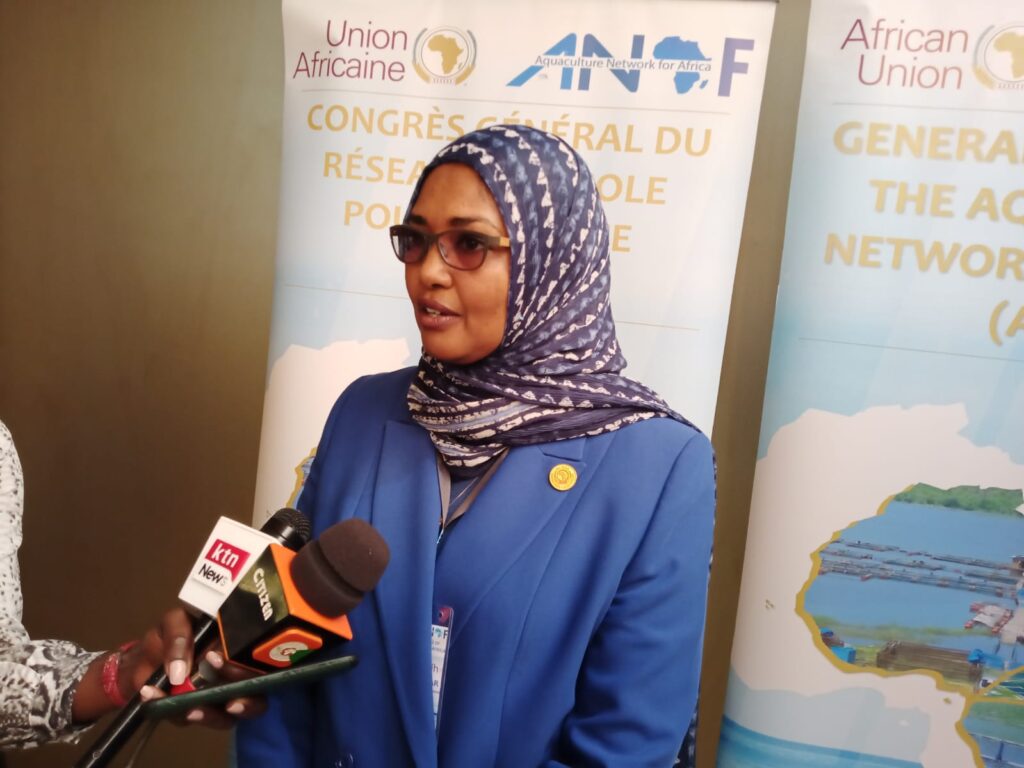With its vast water resources, including lakes, rivers, and coastal areas, the African continent’s capacity for aquaculture development has been identified as a promising solution to address food security, as well as help in poverty eradication.
African Union-InterAfrican Bureau for Animal Resources (AU-IBAR) Director Dr Huyam Salim on Monday said the sector can contribute significantly to meeting the growing need for food by providing a sustainable and efficient means of producing fish, shrimp, and other aquatic species.
Moreover, she noted that the controlled environment of aquaculture systems allows for year-round production, reducing the impact of seasonal variations on food availability.
Speaking at the sidelines of the ongoing three-day AU-IBAR planned 2nd General Assembly Congress of Aquaculture for Africa (ANAF), the Director said a lot remains to be done, in a bid to address the existing bottlenecks.
“One of the main challenges is (lack of) financial capital and bringing of stakeholders together to collaborate and establish evolving investments to cover the requested aquaculture production,” she said.
Through ANAF, however, she said the aquaculture production is set to be enhanced, in a bid to bridge the existing fish production gaps in the continent.
At sidelines of the 2nd #ANAF GA, AU-IBAR Dir. Dr. @HuyamSalih highlights the transformative potential of aquaculture to feed Africa & urges stronger partnerships between African Governments & private sector for enhanced #aquaculture production.
⭐️More: https://t.co/1dp0Sy9qFv pic.twitter.com/5uaF3JWmC4
— AU-IBAR (@au_ibar) January 15, 2024
ANAF was officially endorsed by African Ministers at a recent meeting in Addis Ababa as an African Union-recognized Network to support aquaculture development in Africa with its Secretariat based at AU-IBAR.
According to the AU-IBAR Director, the original concept for ANAF is to serve as a stand-alone continental institution providing technical backing and facilitation to the African aquaculture “subsector and continue to support aquaculture development in the continent, as an autonomous and self-reliant intergovernmental organization.”
To realize the objectives of ANAF, she challenged the private sector to collaborate more with governments, in a bid to develop the sector.
For small-scale aquaculture farmers to thrive, she said governments should ensure there is seamless information sharing and facilitate the creation of cooperatives, for them to access financing from financial institutions.
“There is a need to bring in more private sector players to help enhance aquaculture production,” she said.
During the event, various stakeholders pointed out that small-scale fish farming can empower local communities by creating employment opportunities and generating income.
By encouraging entrepreneurship in aquaculture, the stakeholders drawn from various sectors including the Food Agriculture Organisation (FAO) and the Kenyan government said individuals and communities can build resilience against economic uncertainties.
Additionally, they said the sector promotes gender equality, as women often play essential roles in small-scale aquaculture operations.
Despite its potential, aquaculture in Africa faces numerous challenges.
Limited access to finance and technology hampers the development of the industry, particularly for small-scale farmers.


Also pointed out are infrastructure deficiencies, such as inadequate transportation and storage facilities, which contribute to post-harvest losses, reducing the economic impact of aquaculture.
Senior Fisheries and Aquaculture Officer, FAO Regional Office for Africa Ndiaga Gueye said ANAF objectives include efforts to maximize the utilization of scarce resources for aquaculture development in Africa, fostering sustainable growth to combat poverty, ensure food security, provide employment, and promote rural development.
He pointed out that the objectives align seamlessly with FAO’s mission of achieving, “more efficient, inclusive, resilient, and sustainable agrifood systems for better production, better nutrition, better environment, and better life leaving no one behind.”
In a speech read by Dismas Mbabazi, the Fishery and Aquaculture Officer at the FAO Regional Office for Africa, Gueye said: “Since the 2005 Fish for All Summit, ANAF has grown into a vital force driving sustainable aquaculture development in Africa.”
While aquaculture holds great promise for promoting food security and poverty eradication in Africa, the stakeholders have said concerted efforts are needed to overcome existing challenges.
Investments in technology, infrastructure, and education, coupled with sustainable practices and effective governance, they said can unlock the full potential of aquaculture, fostering economic development and improving the livelihoods of millions across the continent.
Only 600,000 people are directly employed in the sector, in a continent of more than a billion people, with Africa contributing a meager 6 percent in global fish production.
AU-IBAR Director Dr Huyam Salim said the participants will also be looking into ways of promoting Africa’s aquaculture production and ways for governments to partner with the private sector. #ANAF https://t.co/0Z6E1IC9Kn @au_ibar @Tuko_co_ke
— Joseph Muraya (@MrMuraya) January 15, 2024

